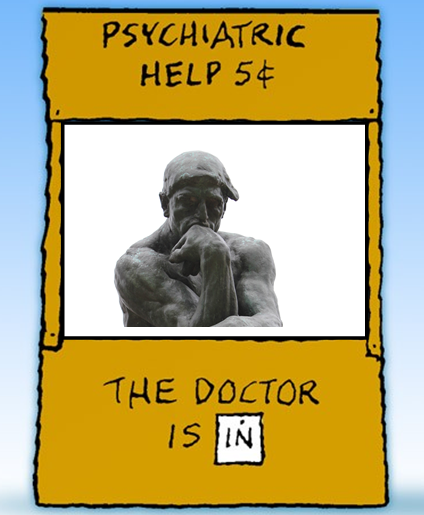Example:
It’s cold in the winter.
• Why is it cold?
Because the sun's rays hit the earth
at a shallow angle
• Why a shallow angle?
Because the northern hemisphere tilts
away from the sun
• Why does it tilt?
It’s a law of physics.
• Why is that a law of physics?
I don’t know.
• Why don’t you know?
I can’t know everything!
• Why can’t you know everything?
I don’t know.
GAME OVER
(death loop - see previous
“I don’t know”)
However immature that game may seem, it actually relates to one part of a problem solving methodology we use where I work. Although I don’t work for Toyota, some of what we do mirrors Toyota’s 5 Whys. The “5” in the name represents how far one might need to dig to get to the root of a matter. It’s not always 5.
Example: The vehicle will not start.
Why? - The battery is dead (1st why)Why? - The alternator is not functioning (2nd why)
Why? - The alternator belt is broken (3rd why)
Why? - The alternator belt was worn beyond its limits (4th why)
Why? - The vehicle was not maintained according to the service schedule
(5th why - root cause)
An average mechanic might stop after answering the third why and then take an effective action. Once the broken belt is observed, it can be replaced and you’re back on the road. An exceptional mechanic however, will think beyond the fix and beyond himself. He will consider outside systems. Why did the belt break? Was it the wrong kind of belt? Was it the right belt, but installed incorrectly? Did other parts of the vehicle, like the alternator pulley, cause the belt to wear prematurely? What other belts are about to break on this car?
Of course,
one can continue to ask why beyond the root cause; beyond the fifth why. Why
wasn’t the vehicle maintained according to the service schedule? Are parts not readily
available? Is it too expensive to maintain for the customer? Is the customer
just lazy? These are all good questions, but in this case no more questions are
needed beyond the fifth why for the mechanic to take superior action, beyond just an effective action. The maintenance question
may be appropriate for the customer or maybe the design team, but no more
information is needed for a mechanic to fulfill his or her duty at the highest
level.
We can use
this concept to help us understand why
we do the things we do. People seek what is good, or at least what they think
is good. As it relates to the human soul, we use our will in the pursuit of
happiness or the pursuit of what is good.
Example: I took my medicine.
Why? – To kill my infection (1st why)
Why? – I wish to be healthy (2nd why)Why? – So I can live well (3rd why)
Why? – Because life is good (4th why)
Why? – Because life is from God and God is good (5th why – the first cause)
One might answer
the fifth why, “Because I like it”. This makes it subjective. One can “be”
alive or “be” dead. You may prefer to be alive, but life itself would not be
objectively good or bad. Those contemplating suicide would say life is bad (for
them). If our final answer to ultimate questions is so self-centered as to
respond “because I like it”, then the part of original sin that dims the
intellect through pride is not difficult to see.
The fifth why
in this case leads away from “self” and points to something more, an outside
system, an irreducible “Good”. Of course, one can continue to ask why. Why is
God good? This is a fair question, but like the superior mechanic, no more whys
are needed for a human being to take the superior answer.
Along the
same vein, people also seek what is true. I can’t imagine anyone in their right
mind intentionally seeking out deception. As
it relates to the human soul, we use our intellect in the pursuit of the truth.
Example: I’m traveling to Boston.
Why? – To meet a friend (1st why)
Why? – To resolve a problem (2nd why)Why? – To learn the truth (3rd why)
Why? – Because the truth is good to know (4th why)
Why? – Because God is truth and God is good (5th why – the first cause)
One might answer the fifth why by saying the truth is good because that’s what I believe or that’s what I want, but again, like the exceptional mechanic that thinks beyond the fix, we should think beyond ourselves. What would make the truth objectively good? If lies made you happy, would that make lies good (for you)?
 |
| Surface Dweller |
Of course, we
can continue to ask why as a sincere invitation to the mind, because there is
always food for the intellect when it comes to the mysteries of God, but
perpetual questioning is not needed for a person to begin or continue their
journey home, and to ultimately fulfill their destiny.
“The
principles are settled. Life is the pageant of men and women living up to them
or failing to live up to them—and I think to-day, if we are to save ourselves,
we need to close our minds, to take honour’s worth for granted and to escape
back into certainty from the atmosphere of eternal questioning.”
—Christopher
Hollis, Death of a Gentleman
So we need to
close our minds? Aren’t we supposed to always have an open mind? Consider that
if your mind is ALWAYS open your brain will eventually fall out. There comes a
time to stop endless questioning.



“Merely having an open mind is nothing. The object of opening the mind, as of opening the mouth, is to shut it again on something solid.”
ReplyDelete― G.K. Chesterton